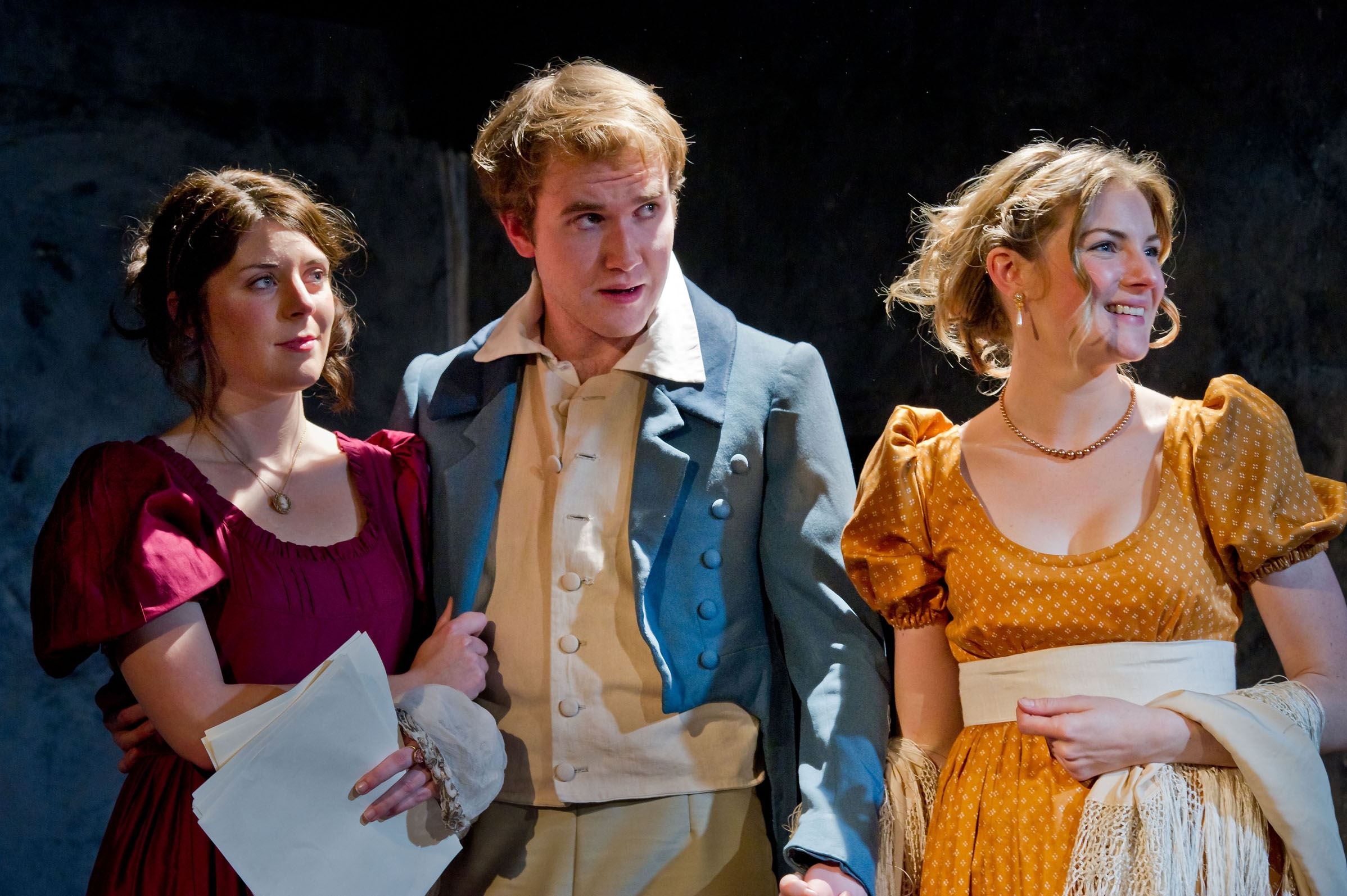Bloody Poetry, Jermyn Street Theatre
reviewed for The Spectator, 15 February 2012

Rhiannon Sommers, Joe Bannister, Joanna Christie
Danny Boyle’s staged version of Frankenstein packed in the crowds to the National Theatre last year with its Olympian scale and throbbing orange sunsets. But if you were hoping for a more intimate invitation to the world of Mary Shelley’s monster, you might be better off popping down to the small but central Jermyn Street Theatre, for fringe company Primavera’s new production of Bloody Poetry.
Howard Brenton’s 1984 play is unflinching in its depiction of the feckless ménage of poets that produced not only Frankenstein, but also Byron’s ‘Don Juan’ and Percy Shelley’s ‘Masque of Anarchy’, along with a traveling assortment of illegitimate children.
Yet in Tom Littler’s engaging, if occasionally uneven, revival Brenton’s lightness of touch shines through, illuminating a sensitive and sympathetic world of disruptive visions and domestic distress, in ‘which life seems more a haunting than a history’.
On the shores of Lake Geneva, Mary Shelley’s stepsister, Claire, insists she’s only sleeping with Lord Byron in order to help her in-laws get to know him better – ‘for the good of English poetry!’ – but her devoted self-debasement soon suggests otherwise.
Rhiannon Sommers’ intelligent, matronly Mary is more concerned with paying the hotel bill and establishing the limits on her husband’s dream of free love, but she still has time to turn Plato into poetry and beat Byron at his own game of dramatising human indignity.
And David Sturzaker’s Byron is a storm of charisma: articulate, revolutionary and utterly selfish, if eventually aging with too many studied ticks and booming pronouncements.
If Bloody Poetry is Howard Brenton’s tribute to England’s ‘radical, republican tradition’ in the face of Thatcher’s oppression, it’s perhaps a blessing that Littler tones down Brenton’s attention to Byron’s committed but chaotic dedication to motley historical conflicts, which are trumpeted offstage but never placed under real ideological scrutiny.
Instead, there’s a subtler focus on Byron’s grasping attempts to find a domestic life with just the right balance of adrenaline-chasing adventure and stable physical affluence, and it’s here that Sturzaker really convinces.
But at the heart of Primavera’s production are Joanna Christie’s captivating, insecure Claire and impressive newcomer Joe Bannister as Percy Bysshe Shelley. Entrancing and mercurial, Christie is a joy to watch, as well as an effective barometer of the play’s emotional range.
Fully alive to the quartet’s erotic dynamic, she’s our key to Byron’s exaggerated perversities: a man who writes filthy sexual letters to his sister but never quite gets round to the reality of incest in person. Claire’s fascination and disgust with Byron guides our own, but it’s Christie who engages our sympathy.
She’s matched by flashes of brilliant promise from Bannister. Bannister’s Shelley is a gentle visionary with a quizzical dignity: always observing, often bemused, but maintaining control of his unorthodox family through the sheer dynamism of his poetic imagination.
With characteristically shrewd casting, Littler has assembled a group of exceptional verse-speakers: Bannister’s powerful interpretation of ‘The Mask of Anarchy’ is worth the price of admission alone.
Similarly, Sommers is highly impressive when trading verse with Sturzaker’s Byron, or resting on the fullness of her vocal power to summon Mary Shelley’s bitter dignity. It’s at the more effusive moments of melodrama that she comes surprisingly close to the ridiculous.
Meanwhile, Nick Trumble gurns his way through the thankless role of Byron’s envious biographer, Polidori, until he pulls out a moment of pure pathos that suggests there’s real talent here, too.
Everything about Bloody Poetry is effective and economical. Will Reynold’s simple backdrop evokes exactly the palette of changeable Lake Geneva, while the production makes the most of clever lighting – even in the Jermyn Street Theatre’s awkward space – to revive the games of shadow play at the heart of Frankenstein.
Littler borrows from the standard textbook for staging Regency chamber drama (flickering lighting makes for moody chiaroscuro effects, while Shelley stares intently into a tripartite candlestick, before lighting his way to bed) but it’s all slick, polished and pacy – and every bit as solid a production as Brenton’s intelligent play deserves.






